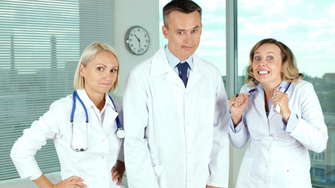Do Medical Television Dramas Portray the Real Healthcare Field?
Totally accurate or not, they provide fast action medical scenarios, which can be later analyzed and evaluated for accuracy and response time. Watching such shows is a learning experience, of sorts, either way.

First there was Dr. Kildare, Marcus Welby, MD and Doogie Howser, MD, then came Dr. Quinn, Medicine Woman, ER and Scrubs and onto House, Grey’s Anatomy, Royal Pains, Nurse Jackie and The Mindy Project. What is real and what isn’t?
With people watching these primetime television shows since the 1960s, and surfing the web for medical information, it is important to know what's fact and what's fiction with regard to accurate medical information.
The Debate Among “Real Doctors”
The real debate is not about accurate medical information; it is about how the medical profession is viewed in the public eye through television.
Modern-day physicians are rarely concerned with the technical information relayed on television dramas. Rather, they worry about how the medical profession is viewed as having too much time for hospital-based romance and socialization.
The Patient Caseload
Here are a few differences in the actual patient caseload between a television MD and a real MD:
- TV doctors treat more trauma and critical cases on a regular basis than real doctors do.
- Most patients requiring CPR on television survive while, in real life, CPR is successful in saving a life about 5% of the time.
The Benefits of Watching TV
Medical students, historically, have been drawn to watch these medical dramas. Totally accurate or not, they provide fast action medical scenarios, which can be later analyzed and evaluated for accuracy and response time. Watching such shows is a learning experience, of sorts, either way.
Medical school professors have been known to use TV drama clips to prove or disprove a point during class lectures. The television genre works in many ways to make a point, sometimes accurate but sometimes just for entertainment purposes.
There have been many real-life cases documenting life-saving events in which the rescuer says that they learned CPR or another emergency medical treatment by watching it on television.
The Downside of Medical Dramas
There are unrealistic portrayals of medicine on some of these weekly medical dramas. Some of them include:
- Critical medical cases are diagnosed and resolved in a one-hour show. This is improbable in the real world.
- A physician is often portrayed as the healthcare provider who can do anything and everything: draw blood, run the lab studies, operate the MRI scanner and then perform the surgery. Again, this is unrealistic medicine.
- Cardiopulmonary resuscitation (CPR) is often incorrectly executed on television. The basic concept is there but it is inaccurately performed.
Medical Accuracy VS Entertainment Value
Clearly, entertainment value wins in this category. The real life dramas related to substance abuse, domestic violence, chronic illness, life-threatening illness and romance abound on the TV dramas. They reel in the audience’s attention.
Most medical dramas take place in a teaching hospital setting, which affords the viewer a look at the medical school pathway and potential social relationships. There are almost an endless number of relationships portrayed such as doctor-patient, doctor-nurse, medical student-doctor, hospital administrator-doctor. This adds the social component.
Through the social and entertainment value of these television shows, there is also an abundance of informal learning for the viewer. Some episodes portray more medical information, fact or fiction, than others. Other episodes contain mostly social involvement with very little medical data.
Most medical dramas use expert medical advisors in an attempt to deliver medical accuracy. People do learn some medical information by watching TV. This has been proven by some of the real-life stories that have been shared by the public. A successful Heimlich maneuver, the basics of CPR or a child learning to call 911 all demonstrate the power of television.
Can I Have the Remote?
Whether looking for a serious show or a little medical humor, medical TV dramas offer a blend of both. They are entertaining, sometimes totally unbelievable, and can scratch the surface of reality. Most of these shows have run for multiple seasons and while they are certainly not the format through which to self-diagnose an ailment or symptom, they are intriguing enough to hold the attention of the viewer from season-to-season.

